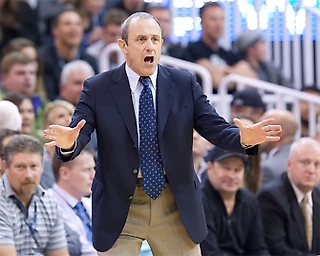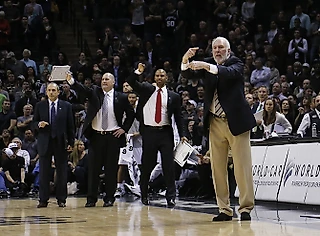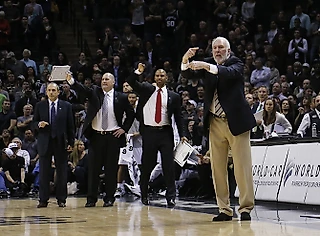Getting back to “European” roles
The trip to America went great. We had the best time in Minnesota and San Antonio. Both Spurs and Timberwolves gave us the warmest of welcomes.
Evaluating the results, of course, we have to take into account that NBA teams were trying to avoid setbacks like injuries and overburdening top players. That was the case for CSKA as well. I think our fans will mostly remember the trip because of the good results and the fact that CSKA has become the only European team to win two games against NBA competition on American soil. But for me, it’s our team play that stood out. We stuck with our way of playing which lies somewhere between the traditional European style and NBA basketball. We shared the ball, got everybody involved and showed some tenacious defense.
We were honored when after the game coach Popovich came into our locker room. He wished us luck for the season, and also said he was impressed by CSKA’s ball movement and our ability to rip defenses with driving and kicking it out.
That was extremely flattering coming from a good friend who also happens to be one of the most distinguished coaches in the history of the game. But here I’d like to point out one thing. In the NBA, because of the style of play and because of the court which is a little bigger, defenses do not do the same kind of pass denial we often see in Europe. We’re used to the fact that every pass is denied, while over there you can, say, rotate the ball from one wing to another with relative ease. And after swinging the ball from side to side we felt comfortable attacking defenders during close-outs.
Add to the equation the defensive 3 seconds rule that slows down weak side help and you’ll see why we were successful with our passing game, elbow pick-and-rolls and drive-and-kick sequences.
Of course, if we had to play a series of games against an NBA team it would surely adjust its defense and push us out of this comfort zone. Still, there’s no denying that teams like Minnesota and San Antonio themselves have a lot of European flavor to their offense. The Spurs are true adepts of driving and kicking while T-Wolves feature Ricky Rubio and Kevin Love, who is the prototypical spread-the-floor power forward.
Speaking of differences, the European version of the game is surely slower and not so much dependant on finding mismatches. For NBA teams, it’s top priority. They have stars who create mismatches simply by stepping on the floor, while for us defensive rules make it much easier to hide defensive deficiencies. That’s why European teams have to create a lot of player and ball movement in order to force a defense to give up even a tiniest bit of territory.
Anyways, the trip was a clear indication that we have the required level of talent, skills and athleticism. As soon as we find chemistry and togetherness, we’ll get ourselves into a good position to reach our goals.
There are challenges you normally face coming off such voyages. The jet lag is a huge problem. According to my assistant Dan Shamir who was at that time working with Maccabi, the Israeli club needed two full weeks to fully recover after a similar trip in 2009. And during that fortnight the team played so poorly it looked like a nightmare.
But why dig that deep to find examples. We all remember what happened to CSKA in 2010-11 when starting the season in the USA plus several injuries later translated into missing out on Euroleague Top-16 entirely.
Still, physical challenges aren’t the only ones you face. During trips like that, you have to expend a lot of mental energy. You really want to play well against NBA teams. And when it happens, there’s that little part of you that might say “Ok. I’m in the US and I can really play with the best of them”. Then you come back and have to face a team that you don’t know that well in front of what’s not exactly an enormous crowd. And you somehow start thinking “I only have to be OK for us to win this”.
And it’s so not true! Here the game is different. It’s shorter and slower which makes every possession all the more important. And it gives the other team, which desperately wants to avoid losing, more opportunities to impose control over what’s happening on the court. Moreover, sometimes more contact is allowed here as compared to the USA, so underdogs often try to rough things up in order to further increase their chances.
Also, over there the game lasts 48 minutes which makes it possible for a coach to give most of his players substantial court time. Their roles naturally expand. And then you’re suddenly back to the 40-minute timeline which makes playing time so much harder to earn. And to be honest, even model pros sometimes grow unhappy when they see their minutes dwindle. Getting back from those two games to your normal “European” role can be really challenging.
It was easy for us to have good on-court chemistry in the US as everyone was getting minutes. But it’s gonna change. We’ve got one of our top players in Milos Teodosic back from injury. And hopefully Andrey Vorontsevich will also return to action some time soon. Those additions will probably mean we’ll face the usual problem most top clubs experience at the start of the season. When you have 10-12 strong rotation players, you just can’t make all of them happy with their playing time.
But as the season progresses, this problem turns into a blessing in disguise. When you’re banged up and tired, when pressure of big games piles up, when opponents start fielding better and deeper rosters – that’s when all of a sudden you start feeling quite happy to have a whole bunch of talented teammates watching your back. Because now you realize that’s the only way to win. But until that revelation arrives, you have to go through a hard process of distributing playing time and adjusting roles.
And that’s what we’re still doing right now. Defining roles and getting a feeling of which combinations of players we can rely on. To put it simply – who plays better with whom? Mental, physical and technical compatibility of players is really important.
Plus, and we’ve already covered that before, we have to define our SWAT team – a crunch time go-to group comprised of not necessarily our top five players (who at a club like CSKA are not easy to define, by the way) but also of glue guys who will give their all, do the ultra important little things and won’t be swayed by the pressure.
All players are different. Some firmly believe that everything starts with defense. Others are naturally inclined to think that once we get going offensively, defensive issues will sort themselves out. You have to understand those mindsets in order to create effective on-court combinations.
We were fortunate to win our first three games coming off the trip. In the two VTB League contests we pulled away with strong fourth quarters, while the physical, grind-it-out game in Nanterre saw us stage a comeback all the way from “-14”. Now we’re about to go into a tough game versus Budivelnik which we can not take lightly, even though some of the fans are probably already looking forward to those Fenerbahce and Barcelona epics.






